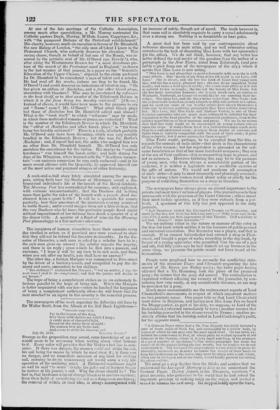A great deal has been said by our contemporaries about
actresses dressing in male attire, and we well remember setting ourselves to the task of disgusting Miss Love with her epiccenities (in the Atlas). We do not think, however, that any writer has better defined the real merits of the question than the author of a paragraph in the New Times, dated from Edinburgh, (and pro- bably copied from one of the newspapers of the city,) where it seems that Miss Love is now acting.
"Miss Love is not altogether so great a favourite with us as she is with some others. Our 'dream of joy from morn till night is not Love, still Love.' She is clever, and she has the kind of figure that young men like, and she has a saucy, pleasant face ; she can do an impudent thing neatly, and make a bald speech archly ; she wears male attire as if it was as natural to her as female ; she has not the beauty of Miss Foote, but she has more masculine humour ; she is very much such an actress as Wycherly, Vanburgh, or Congrnve would like to see enacting their he- roines. She sings too, and she has a better voice than Miss Foote ; but she is deservedly looked on as only a fourth or fifth-rate actress in London, and we must say some of our worthy critics have shown themselves a little raw in diverse initiatory paragraphs they have written concerning her. Miss Love, like Miss Foote and Madame Vestris, is one of those feminine anomalies who are much more willing tei be indebted for their reputation to the loud plaudits of the unmarried gentlemen, than to the quieter approbation of their mammas and papas. We are by no means sure that this taste ought to be encouraged in young women who go upon the stage. It makes them trust to a well-turned ankle much inure than to a well-performed scene : it makes them fonder of surtouts and tights than is entirely compatible with the good of their souls; it gives them notoriety, but it never secures for them respect."
Miss Foote ought, perhaps, to be excepted front this trio, as regards the censure of male attire—that dress is the characteristic of the other women : but her reputation is grounded on the self- same foundation as that of her more barefaced compeers ; they aimn at the sex of their auditors—it is as women they hope to please, and not as actresses. However titillating this may be to the passions of young men, who form always a considerable portion of the audience, it is neither a legitimate nor a creditable exercise of the gifts of nature. We would not condemn all assumption of male attire—it may be most innocently and pleasingly assumed ; but it is wrong when women travel about solely or chiefly for the purpose of exhibiting themselves on a stage in breeches.


















 Previous page
Previous page